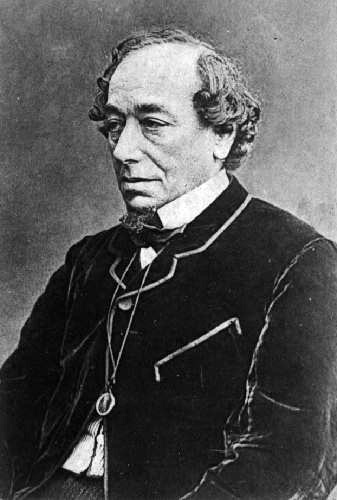Benjamin Disraeli Citations
Benjamin Disraeli: Citations en anglais
Speech in House of Commons, as recorded (in third person) in the | minutes of 20 June, 1839 http://hansard.millbanksystems.com/commons/1839/jun/20/education-adjourned-debate#S3V0048P0_18390620_HOC_4.
1830s
Contexte: [It appears to me that] the Society of Education, that school of philosophers, were, with all their vaunted intellect and learning, fast returning to the system of a barbarous age, the system of a paternal government. Wherever was found what was called a paternal government was found a state education. It had been discovered that the best way to insure implicit obedience was to commence tyranny in the nursery. There was a country in which education formed the only qualification for office. That was, therefore, a country which might be considered as a normal school and pattern society for the intended scheme of education. That country was China. These paternal governments were rather to be found in the east than in the west, and if the hon. Member for Waterford asked [me] for the most perfect programme of public education, if he asked [me] to point out a system at once the most profound and the most comprehensive, [I] must give him the system of education which obtained in Persia. Leaving China and Persia and coming to Europe, [I] found a perfect system of national education in Austria, the China of Europe, and under the paternal government of Prussia. The truth was, that wherever everything was left to the government the subject became a machine.
“England does not love coalitions.”
Speech http://hansard.millbanksystems.com/commons/1852/dec/16/ways-and-means-financial-statement in the House of Commons (16 December 1852).
1850s
Contexte: Yes! I know what I have to face. I have to face a coalition. The combination may be successful. A coalition has before this been successful. But coalitions, although successful, have always found this, that their triumph has been brief. This too I know, that England does not love coalitions.
“Assassination has never changed the history of the world.”
Addressing the House of Commons after the assassination of Abraham Lincoln (1 May 1865).
1860s
Contexte: There are rare instances when the sympathy of a nation approaches those tenderer feelings which are generally supposed to be peculiar to the individual, and to be the happy privilege of private life, and this is one. Under any circumstances we should have bewailed the catastrophe at Washington; under any circumstances we should have shuddered at the means by which it was accomplished. But in the character of the victim, and even in the accessories of his last moments, there is something so homely and innocent, that it takes the question, as it were, out of all the pomp of history and the ceremonial of diplomacy; it touches the heart of nations, and appeals to the domestic sentiment of mankind.
Whatever the various and varying opinions in this House, and in the country generally, on the policy of the late President of the United States, all must agree that in one of the severest trials which ever tested the moral qualities of man he fulfilled his duty with simplicity and strength. …When such crimes are perpetrated the public mind is apt to fall into gloom and perplexity, for it is ignorant alike of the causes and the consequences of such deeds. But it is one of our duties to reassure them under unreasoning panic and despondency. Assassination has never changed the history of the world. I will not refer to the remote past, though an accident has made the most memorable instance of antiquity at this moment fresh in the minds and memory of all around me. But even the costly sacrifice of a Caesar did not propitiate the inexorable destiny of his country.
“I am the blank page between the Old Testament and the New.”
Cited in Herbert Henry Asquith, Letters of the Earl of Oxford and Asquith to a Friend, Vol. 2 (1933), p. 94.
Sourced but undated
Contexte: Miss Sands told me that Queen Victoria, who was latterly éprise with Disraeli, one day asked him what was his real religion. "Madam," he replied, "I am the blank page between the Old Testament and the New."
“Time is precious, but truth is more precious than time.”
Speech at Aylesbury, Royal and Central Bucks Agricultural Association (21 September 1865), cited in Wit and Wisdom of Benjamin Disraeli, Earl of Beaconsfield, Collected from his Writings and Speeches (1881), p. 356
1860s
“When men are pure, laws are useless; when men are corrupt, laws are broken.”
Part 6, Chapter 3
Books, Coningsby (1844), Contarini Fleming (1832)
Part 1, Chapter 13; sometimes paraphrased: "Never apologize for showing feeling. When you do so, you apologize for the truth."
Books, Coningsby (1844), Contarini Fleming (1832)
“All is mystery; but he is a slave who will not struggle to penetrate the dark veil.”
Part 5, Chapter 18.
Books, Coningsby (1844), Contarini Fleming (1832)
“This shows how much easier it is to be critical than to be correct.”
Speech http://hansard.millbanksystems.com/commons/1860/jan/24/address-in-answer-to-her-majestys-speech in the House of Commons (24 January 1860); see also Lord Byron, "Notes to Canto II" (1812), Childe Harold's Pilgrimage: "How much easier it is to be critical than to be correct".
1860s
Variante: How much easier it is to be critical than to be correct.
“To be conscious that you are ignorant is a great step to knowledge.”
Book 1, chapter 5.
Books, Coningsby (1844), Sybil (1845)
Variante: To be conscious that you are ignorant is a great step to knowledge.
“Like all great travellers I have seen more than I remember, and remember more than I have seen.”
Book VIII, Chapter 4.
Books, Coningsby (1844), Vivian Grey (1826)
“Everything comes if a man will only wait.”
Bk. IV, Ch. 8.
Source: Books, Coningsby (1844), Tancred (1847)
“My idea of an agreeable person," said Hugo Bohun, "is a person who agrees with me.”
Source: Books, Coningsby (1844), Lothair (1870), Ch. 35.
“Read no history: nothing but biography, for that is life without theory.”
Part 1, Chapter 23.
Books, Coningsby (1844), Contarini Fleming (1832)
